The most important basic exercises with the Sling Trainer
Execution: Look for an exact execution of the exercises, this is more important than the number of repetitions or the selected difficulty level. The amount of force should be the same on the left and right. After a few training sessions with the SlingTrainer you will have become accustomed to the execution of the exercises.
Training duration: Plan 30 to 45 minutes for a full-body workout or train specific muscle groups in between. For each exercise you need about 2-5 minutes. Depending on the intensity of the workout, do 2-3 sets of 8-15 repetitions each. Between each set, take a 10-20 second break.
Biceps Workout
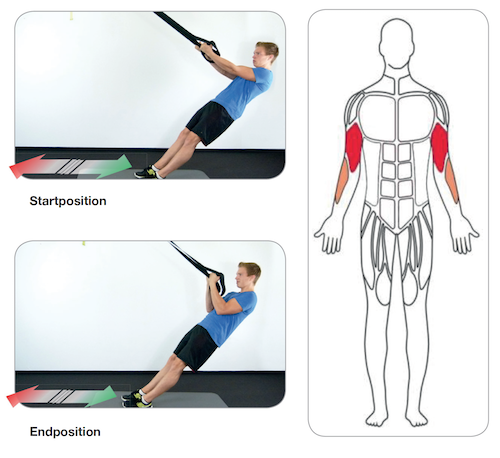
Movement sequence: You stand shoulder-width apart, palms clasping the handles and point upward, arms slightly bent stretch forward, the body Straight tilt back, keep body tension. Pull the upper body up evenly, bending the arms. The elbows remain at about shoulder height, arms parallel. The palms now point toward the face. Slowly stretch the arms forward again and repeat the exercise. The more upright you stand during this exercise, the easier the exercise will be for you.
What you should pay attention to:The center of the movement is in the elbows. Bend the elbows to the maximum. When straightening up not by pulling the pelvis forward. simplify!
Triceps workout
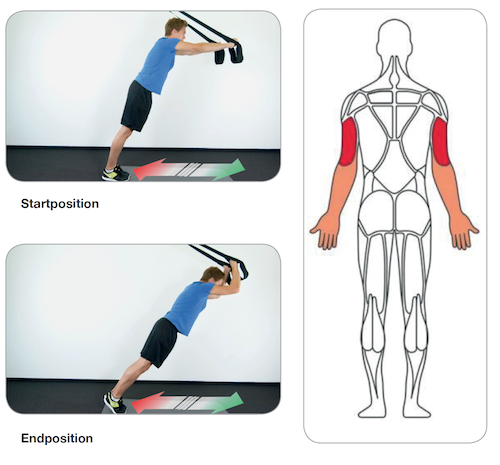
Movement sequence: You stand shoulder-width apart, palms clasping the handles and point downward, stretch arms forward, tilt body forward, hold body tension. Lean, keeping body tension. The movement is at the elbows. Bend arms until hands are above are above in front of the head. The upper arms always remain at shoulder height and parallel to the floor. The palms now point forward. The heels lift slightly off the floor. Slowly stretch your arms forward again and repeat the exercise. The more upright you stand, the easier this exercise will be.
What to look for: The center of the movement is in the elbows. The shoulder and the entire upper body remain still, arms parallel to each other. When pressing up, do not push the pelvis backwards, back and Legs form a straight line!
Delta Muscle Training

Movement sequence: You stand shoulder-width apart, palms clasping the handles and point to each other. Extend arms slightly bent forward at shoulder level, tilt the body straight back, always keeping body tension. Slowly pull the arms to the side, keeping the arms extended. The body is guided upward. The palms now point forward. Slowly stretch the arms and bring them forward again, slowly lowering the body back to the start position. slowly lower the body back to the starting position and repeat the exercise. The more upright you stand during this exercise, the easier the exercise will be.
What to look for:The center of the movement is in the shoulders. The arms remain slightly bent. The entire body is tense and straight.
Chest muscle workout
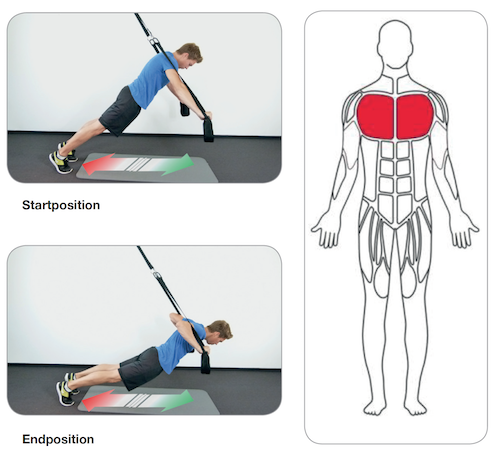
Movement sequence: You stand hip-width, arms stretched forward at shoulder height, palms clasping the handles and pointing downward. The body straight forward tilt, keep body tension, the heels lift off the off the floor. Slowly bend the arms, bring the hands right next to the body and tilt the upper body down. tilt the upper body downward. The strength comes from the arms. Slowly return the arms to the starting position. Straighten the body again. straighten up. Repeat the exercise.
What to look for: The center of the movement is in the arms. The entire body is straight and tense (especially the abdomen). The shoulders leave stable. Do not simplify by hip movements, do not fall into a hollow back. fall.
Back Muscle Training
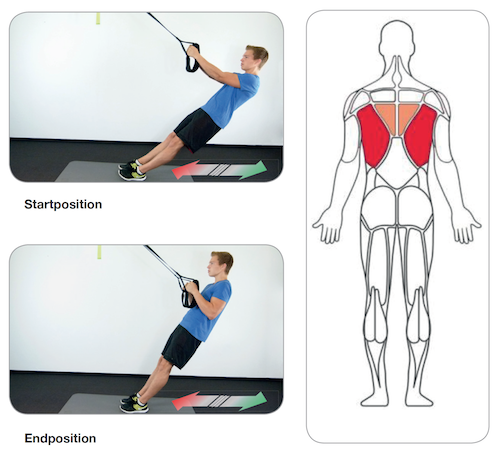
Movement sequence: You stand shoulder-width apart and take one grip each in your Hand. The palms face each other. The arms slightly bent at shoulder height stretch forward in front of the body and tilt the body straight back. back, keeping body tension. Now pull the handles toward you, bending the arms and keeping them parallel and close to the body. parallel to the body. The body is moved upwards. Slowly stretch the arms forward again, tilt the body back and repeat the exercise. and repeat the exercise. The more upright you stand during this exercise, the easier it will be.
What to look for:The elbows stay close to the body and move In an imaginary extension of the band. Do not simplify by hip movements. The entire body is tense and straight.
Abdominal workout
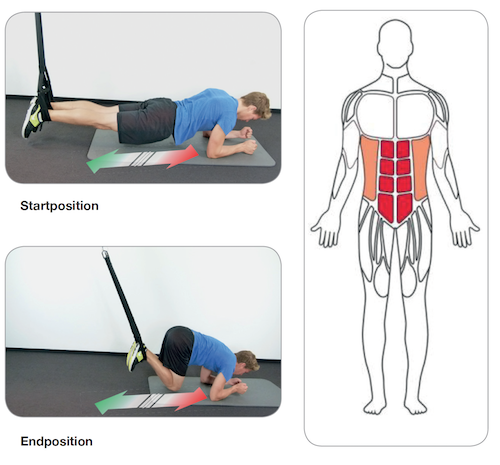
Movement sequence: Hook your feet into one loop each. Support yourself shoulder-width apart with your forearms on the floor. Your legs are extended, Maintain body tension and lift your buttocks slightly. Tilt pelvis forward and tense the pelvic floor, but do not make a hollow back. Now bend your knees and pull them towards your chest, tightening your abdomen. Slowly return the legs to the starting position and repeat the exercise. The exercise will be harder if you position the forearms further forward. Go slowly at this.
What to look for: Adjust the length of your sling trainer so that your Toes are at least 5 cm above the floor during the entire exercise. Advanced can also perform this exercise in the push-up position with arms outstretched. Perform. * A very good extension for advanced users: Combine this exercise (with Stretched arms) with subsequent push-ups!
Lateral back / abdominals
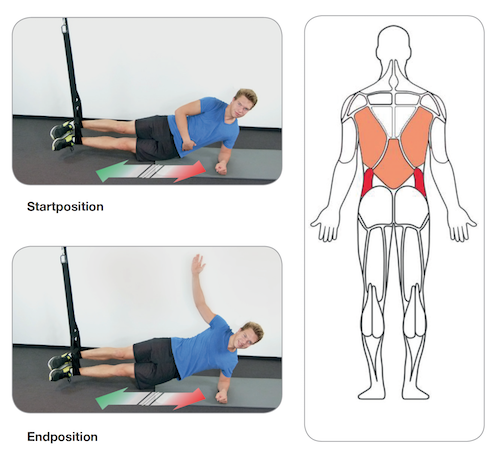
Movement Sequence: Hook both feet into the loops. Lie down sideways on the floor and support yourself with your forearm on the floor. Elbow under shoulder, upper arm vertical. Upper arm and forearm form form a right angle. Now move your hips upward, pointing your free hand upward as well. free hand also pointing upward. Tense the body and keep it horizontal. Now slowly move your hips up and down. Keep your pelvis straight and do not and do not tilt forward or backward. Change sides by turning so that you are facing the other direction. face. Perform 3 sets for each side. The farther you get from the suspension point, the more difficult the Exercise.
What to look for: The center of the movement is in the torso and hip area, not in the arms or shoulders.
Thigh Training
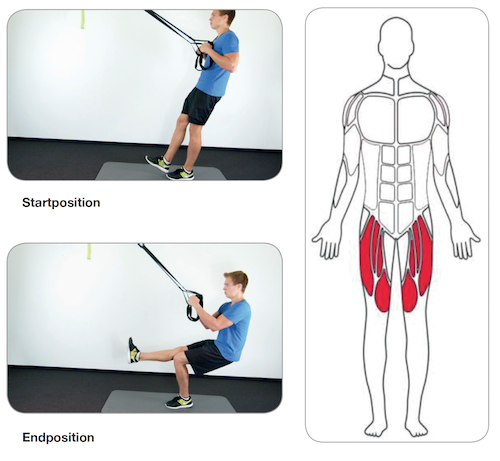
Movement sequence: You stand on the leg to be trained, the palms of your hands enclose the handles and point inward. The arms are bent. The upper body tense, keep straight and tilt slightly backward. Stretch the other leg leg horizontally forward and slowly bend your knees, supported by the force your hands - into a squat position. The knee of the exercising leg is vertically above the foot. Pull the toes of the extended leg in. Switch sides after each set and repeat.
What to look for: The center of the movement is at the knee of the leg being leg to be exercised. The shin is straight and the knee is not moved beyond the Moved beyond the ankle joint. Be sure to start this exercise slowly and increase by going a little lower each time, at most until the thigh is parallel to the floor. Thigh is parallel to the floor.
Buttocks

Movement sequence: You stand on one leg (standing leg). The foot loops together take the other leg in the footstraps and pull forward (see start position). Pull (see starting position). Tense the upper body and keep it upright. The body's center of gravity rests on the entire sole of the standing leg. With the leg into a squat position, keeping the heel of the supporting leg firmly on the floor and the Keep the heel of the supporting leg firmly on the floor and bring the hooked leg back. The sole of the foot points backward or upward. The knee of the standing leg must be directly above the foot. over the foot. To maintain balance, the arms perform a symmetrical Movement (similar to jogging).
What to look for:The center of the movement is in the buttocks and In the knee of the standing leg. Be sure to start this exercise slowly. More challenging the exercise becomes, by the angle between the thigh and the calf. between the thigh and the calf. It is important that the back remains and straight the whole time - do not make a hollow back or a curved back. Do. While going into the squat, the heel of the supporting leg must remain on the floor. must remain on the floor. In addition, make sure that the knee of the supporting leg is always directly above the foot. is always directly above the foot, at no time further forward.






